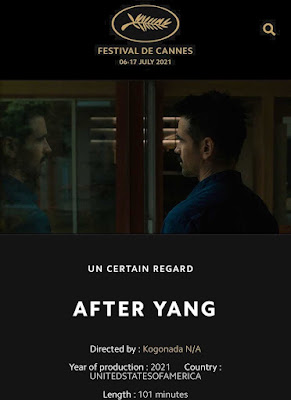Supposedly, this near-future world is dangerously overpopulated and environmentally degraded, but you would not know it from the vast lonely prairie vistas surrounding Henrietta (Hen) (who never has need of any protective gear). She endures the loneliness that drove the Badlands settlers mad. For her husband Junior, this is what life is supposed to look like. Perhaps that is why their marriage has been strained. However, they must soon spend a year apart, except maybe not exactly. Their dystopian government has a plan to address their needs, but as usual, it will have unintended consequences in Garth Davis’s FOE, which opens today in theaters.
Terrance is from the government and he is here to help. It turns out Junior has been selected to work on the international space station for a year. You wouldn’t think they need many dirt-farmers in space, but it is for some kind of rural poor representational quota. Of course, that means he must leave Hen alone for an entire year, in the over-populated world, where her only contact with other people comes from waiting on tables in a tiny little diner.
For her sake, Terrance will AI-clone Junior, but to do so properly, he must know the darkest corners of Junior’s mind and truly understand the state of their marriage. To that end, he moves in with the couple and constantly asking uncomfortable sexual questions, like James Spader in Sex, Lies, and Video Tape.
FOE could have been an effective Outer Limits-style thriller if it played up the dystopian paranoia and wasn’t set in the middle of acres and acres of wide-open scrub grass. However, Davis opted instead to make a Terrence Malick film. Although, in a weird way, all the hazy, sun-flared staring off into the horizon misdirects viewers from the surprise twist.
In fact, FOE addresses some big ideas in a surprisingly thoughtful manner. However, getting to that good stuff requires enduring the equivalent of cinematic anesthesia. If you’re not sufficiently caffeinated, it will likely put you out. To say the pacing is slow and deliberate would be diplomatic.







